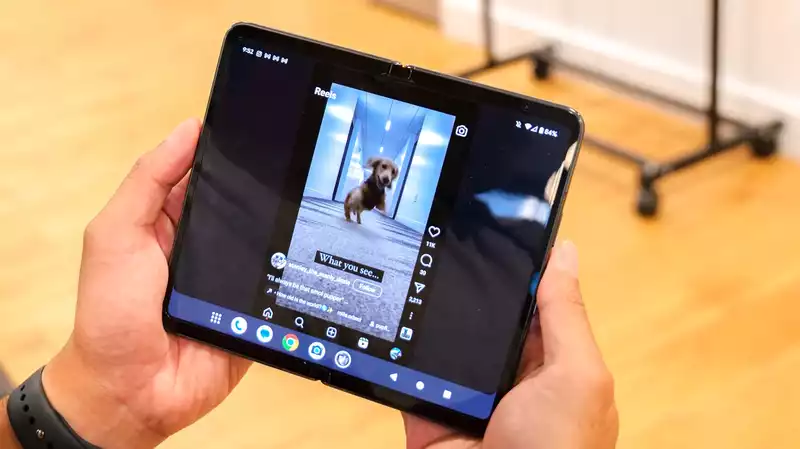Since the Pixel Fold is Google's first foldable, the company needs to convince consumers that it has created a strong competitor to Samsung's Galaxy Z Fold 4. And despite some solid reviews, some initial hurdles have arisen.
Already, problems seem to be swirling around the Pixel Fold's durability and design, and some new owners have noticed cosmetic issues around the inner display. I have not experienced any such issues with my Pixel Fold, but there is actually another problem.
One of the advantages of having two displays on the Pixel Fold is that the 5.8-inch outer display alone can be used just like any good smartphone. Then there is the option to use it larger by opening the folded portion to reveal the larger inner display. At a whopping 7.6 inches, the OLED panel with a 120 Hz refresh rate is stunning, especially when watching high quality videos on YouTube.
I like the productivity of the Pixel Fold's split-screen mode. It allows me to work more efficiently. For example, it's so much easier to click on a photo stored in my photo gallery and drag it into an email I'm composing in Gmail, or scroll through my Instagram feed while having a conversation in Slack.
In full-screen mode, things are even better when running apps on their own. Like tablets, these apps are usually optimized to take advantage of the extra space.
Native apps, such as Gmail, YouTube, and Google Maps, get the treatment they deserve for taking advantage of the extra space. And thanks to the Tensor G2 built into the Pixel Fold, these apps run surprisingly smoothly and responsively, making my workflow much easier. For example, Gmail displays the entire inbox on the left side of the screen in split mode, with selected emails on the right.
Not surprisingly, native Android apps are optimized for the Pixel Fold's large screen, but after installing all the apps I use daily, it became apparent that the Fold does not work well with third-party apps. This is because the majority of the apps do not zoom in properly, often leaving large gaps on either side of the app screen.
Instagram, Facebook, and Yelp have all fallen victim to this problem while I have been using the Pixel Fold. You would think that with the inner display, all apps would expand to some degree to provide a more practical layout.
I play Age of Origins religiously and am well aware of how much better the Google Pixel Fold vs. the Samsung Galaxy Z Fold 4 looked when played on the Samsung foldable. The expansive world map is laid out in such a way that it extends to the edges of the display, but on the Pixel Fold, the annoying black bars on the left and right get in the way.
So why are they there? It's because the game is scaled like a standard smartphone. I (eventually) learned that rotating the Pixel Fold causes some apps to scale to fill the display. It's a simple action, but users shouldn't have to do this because our instinct is to do so automatically when we open Pixel Fold. Check out how some games and popular third-party apps load in Pixel Fold below.
I found other quirks that further add to my frustration with Pixel Fold. Another game I ran in full-screen mode remained locked in place even when I rotated the phone, and returning it to its normal position did not change that. Eventually, I had to restart the game to fix it.
The reason this happens is that some apps do not yet support responsive layouts, so these apps are centered on the display, creating dead space on the sides. When asked for comment, a Google spokesperson responded, "We are actively working with our developer partners to optimize even more apps for the foldable form factor and have made significant progress in the past year alone." In the meantime, rotation is the best way to expand our vertical-only apps."
While Google's entry into the foldable space with the Pixel Fold could be forgiven for being its first-generation product, I had higher hopes for the software. Knowing what is at stake and the current competitive landscape, one would think Google would have paid closer attention to how apps work on the Pixel Fold.
If you recall, the original iPad faced the same problem where many third-party apps simply expanded to take up the entire display. Those were the same apps found on the iPhone, but they were enlarged. Since the release of Android 3.0 Honeycomb, Google has introduced a proper tablet operating system.
Thankfully, Google continues to work with developers on this issue, which could all be remedied with a simple software update. It may take time to detail all of the nuances of scaling apps to fit the aspect ratio of the display, but it would be a big push to refine Pixel Fold. However, it would give a big boost to the refinement of Pixel Fold. Now that it is finally here and available to the masses, I hope this gets fixed quickly.
.









Comments